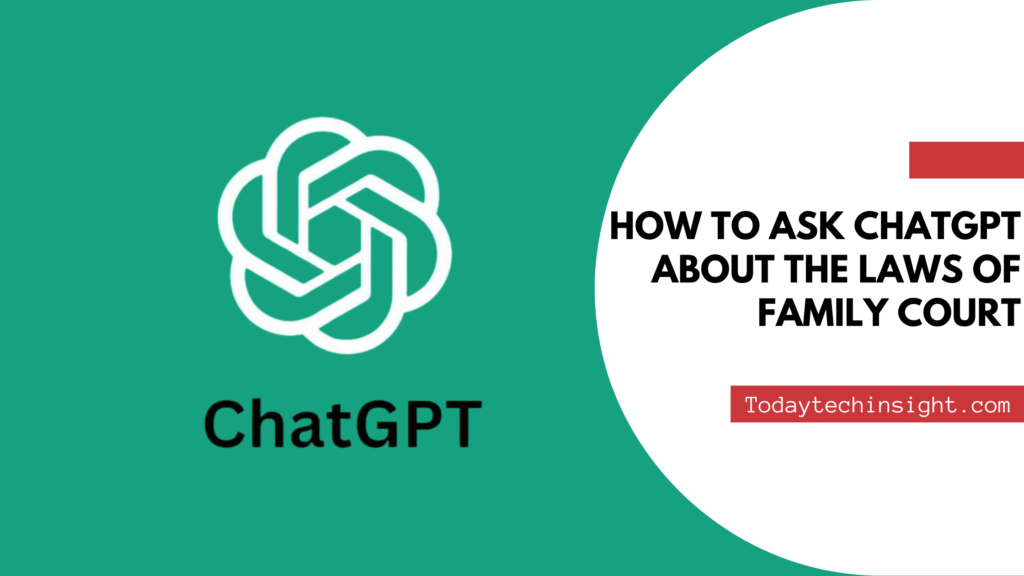Family court proceedings often involve emotionally charged and complex legal matters such as divorce, child custody, and domestic violence. Whether you are preparing for a case or simply seeking to understand your rights, asking ChatGPT the right questions can help you gain clarity. This guide will help you craft effective questions to get accurate and relevant information from ChatGPT about family court laws.
How to Ask ChatGPT About Family Court Laws:
- Specify Jurisdiction: Mention your state or country to get location-specific legal information.
- Define Your Focus: Clearly identify the specific area of family law (e.g., child custody, divorce, domestic violence).
- Add Relevant Details: Include key details or context, such as the type of custody you’re interested in or specific concerns in your case.
- Ask Precise Questions: Example: Instead of “What are child custody laws?” ask “How does California decide child custody in joint custody cases?”
Understanding ChatGPT’s Capabilities and Limitations
Before diving into how to ask your questions, it’s essential to understand what ChatGPT can do and its limitations.
What ChatGPT Can Do:
- Provide General Information: ChatGPT can give you an overview of family court laws, explain legal concepts, and answer general questions.
- Explain Legal Terms: If you come across legal jargon, ChatGPT can break it down into simpler language.
- Guide You to Resources: It can suggest types of resources or organizations that may offer more detailed assistance.
What ChatGPT Cannot Do:
- Offer Legal Advice: ChatGPT is not a substitute for a lawyer and cannot provide specific legal advice tailored to your case.
- Guarantee Up-to-date Information: Family laws change over time and vary by jurisdiction, so always verify the information you receive.
- Act as Legal Representation: For legal representation or advice, consult a qualified attorney.
Steps to Ask ChatGPT Effectively About Family Court Laws
1. Identify Your Specific Needs
Jurisdiction
Family court laws differ widely depending on your location. Mentioning your specific jurisdiction (country, state, or region) ensures the information provided is as accurate as possible.
Example Questions:
- “Can you outline the family court laws in California, USA?”
- “What are the typical divorce proceedings in Ontario, Canada?”
Topic of Interest
Family law encompasses various areas such as child custody, child support, divorce, adoption, and domestic violence. Clearly state the specific area of family law you’re interested in to get targeted answers.
Example Questions:
- “What factors do family courts consider in child custody cases in Texas?”
- “How is child support calculated in New York?”
2. Seek Direct Answers
When you know what information you need, ask direct and specific questions to get concise and relevant answers.
General Information
- “What are the primary issues that family courts deal with in [specific country]?”
- “How does family law generally approach joint custody in [specific jurisdiction]?”
Child Custody
- “What are the factors family courts use to decide custody in [specific location]?”
- “How does joint custody work in [specific jurisdiction]?”
Child Support
- “How is child support calculated in [specific location]?”
- “What does a court consider when determining the legal requirements of child-support payments in [specific state]?”
Divorce Proceedings
- “What are the legal grounds for divorce in [specific jurisdiction]?”
- “How is division of assets handled in a divorce case in [specific location]?”
Adoption
- “What are the legal procedures to adopt a child in [specific country]?”
- “What are the requirements for adoption in [specific state]?”
Domestic Violence
- “What protections are available for a victim of domestic violence in family court in [specific location]?”
- “How does someone get a restraining order in [specific jurisdiction]?”
3. Seek Advice or Resources
If you need more detailed information or specific guidance, ChatGPT can suggest general resources or organizations that might help.
Example Questions:
- “Can you recommend any resources or organizations that provide family court-related legal consultation services in [place]?”
- “Where can I find detailed information on family law in [specific place]?”
4. Clarify Your Understanding
If an explanation is unclear or you need further elaboration, don’t hesitate to ask follow-up questions.
Example Questions:
- “Can you clarify the term ‘best interests of the child’ in the context of family law?”
- “What does ‘equitable distribution’ mean in divorce proceedings?”
Sample Questions for Different Areas of Family Law
General Information:
- “What are the main areas covered by family court law in [specific location]?”
Child Custody:
- “What factors influence child custody decisions in [your state]?”
Divorce:
- “How does asset division work in divorces in [specific jurisdiction]?”
Adoption:
- “What steps are involved in adopting a child in [specific country]?”
Domestic Violence:
- “How do restraining orders work in family courts in [specific location]?”
Conclusion
When asking ChatGPT about family court laws, specificity is key. Clearly identifying your jurisdiction, topic of interest, and what you hope to learn will help you receive more accurate and relevant information. While ChatGPT can be a helpful tool for general information and clarification, always consult with a legal professional to ensure you receive personalized advice tailored to your unique situation.
This approach will equip you with the knowledge needed to navigate family court issues more confidently and effectively.




Thank you for your sharing. I am worried that I lack creative ideas. It is your article that makes me full of hope. Thank you. But, I have a question, can you help me?
yes sure whats your question